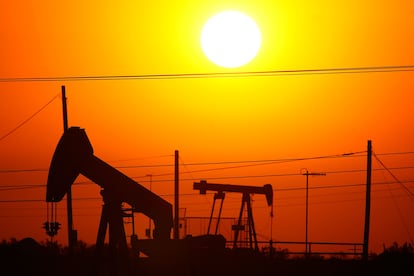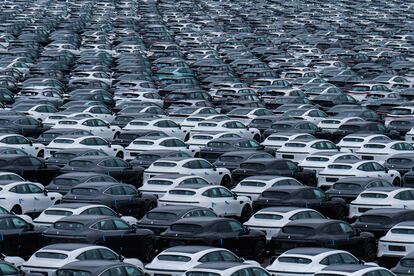Cars, plastics, and even clothes: Is a world without fossil fuels possible?
It is difficult to imagine a future without coal, oil, or gas, since the world is dependent on them in countless applications, but alternatives already exist that can drastically reduce their use


Fossil fuels (coal, oil, and gas) are the world’s main sources of fuel for cars, airplanes, and freight ships. They are also used to heat homes and power industries. They are essential for manufacturing cement and steel and are the base of the plastics used to make almost everything, including the synthetic polyester and nylon fibers of most clothes. And there are many other applications, such as fertilizers, medicines, cosmetics, cleaning products, synthetic rubber, asphalt, and other man-made materials. The modern world would not have been able to develop as much in the last century without these strategic resources. However, the world is now looking for an emergency exit to get away from them.
This is the big issue that nearly every country in the world is negotiating at the COP28 climate summit in Dubai. The participants are hoping to reach an agreement for the phasing out of fossil fuels, as they also constitute the main cause of global warming, posing a serious threat to mankind. It will be no easy task, given the enormous economic interests at stake. Agreement will be all the more difficult to reach at a conference in the United Arab Emirates, chaired by Sultan al-Jaber, the country’s Minister of Industry and CEO of one of the world’s largest oil companies. But never before have countries so directly addressed weaning themselves off coal, oil, and gas. Even al-Jaber himself, who is not exactly an activist against fossil fuels, has said that their gradual elimination “is inevitable.”
Regardless of how this climate summit ends, the question is: what is the path to abandoning resources with so many applications in today’s society? Mariano Marzo, emeritus professor and (until this year) director of Energy Transition at the Faculty of Earth Sciences of the University of Barcelona with the Repsol Foundation, does not believe it is possible to completely uncouple from them in the near future. According to the geologist, from an energy point of view, in 2022 coal, oil, and natural gas accounted for 80%-82% of global primary energy consumption. Furthermore, he emphasizes that, “as Vaclav Smil reminds us, the four pillars of modern civilization are cement, steel, plastics, and ammonia, and all of these materials require fossil fuels for their manufacture.”
“In all probability, hand in hand with R&D and the consequent technological developments that are made, the percentage contribution of hydrocarbons to the global energy mix may be significantly reduced in the coming decades (very particularly in the case of coal), although they will not be eliminated in their entirety,” says Marzo. “It seems difficult to electrify a substantial part of economic activity relatively quickly, as is the case of industries that need to operate at high temperatures (cement, ceramics, and steel, for example). Furthermore, air and maritime transport (which represents 80% of the global movement of goods) requires an energy density (amount of energy per unit of weight or volume) that, today, represents a great challenge to its being electrified.”
With regard to obtaining other materials from these fuels, the geologist, who was also re-elected in 2021 as an independent director of the oil company Repsol, foresees a significant increase in global petrochemicals. “Paradoxically, plastics are essential to make lighter vehicles, such as electric cars that require a large amount of plastic because it is cheap, durable, and light,” he comments. “Wind turbine blades also require plastic and other petrochemicals, just as solar panels do.”

For Romain Ioualalen, representative of Oil Change International, an organization that seeks the end of these fuels, the essential thing is to start disconnecting now. “We are not saying that we must abandon all fossil fuels overnight, but the longer it takes for governments to begin the transition, the more costly it will be later, since there will be less and less time to do it gradually,” he says in a telephone conversation from the Dubai Climate Summit. “We must start with what is most obvious, such as the transition to renewable energies or stopping launching new fossil fuel plants,” says this climate activist, who says that “the argument that we cannot get away from fossil fuels because they will always be needed for different applications is a smokescreen used by the fuel industry to delay the transition.” “If we want to stabilize the planet’s climate, the production and consumption of fossil fuels must begin to decrease in all sectors now, not in 10 or 15 years,” says Ioualalen.
This is also the opinion of Pedro Fresco, an expert in the ecological transition who is also the director of the Energy Sector Association of Valencia (Spain). Fresco emphasizes that “the part of fossil fuels [needed] to produce a wind turbine blade or for renewables in general is minuscule; that cannot be the excuse.” “It is a question of time. The first thing to transition is the things that already have an alternative. The main thing is transportation, and the easiest is light transportation. Heating is also easy to switch over.” According to Fresco, road transport is what demands the most oil today. “It is here, and in residential use, where it can be cut the most. Then the strategy must be more nuanced.” On this point, the European Union approved a law this year that prohibits the sale of all new cars and vans with combustion engines (with the exception of the so-called e-fuels) in community territory from 2035.
Emissions capture
There is another, different strategy that the fossil industry advocates: instead of replacing these fuels, it seeks to capture the CO₂ emissions they generate and store them in the subsoil. The United States special envoy for Climate Change, John Kerry, said at the COP28 that his country advocates a gradual phasing out of fossil fuels from its energy system to achieve the goal of net-zero emissions by 2050, while using CO₂ capture. “Science says we have to reduce emissions […] We think that means that if you are going to reach the goal of net-zero emissions by 2050, you have to phase out (fossil fuels), there is no other way,“ he noted in Dubai while arguing in favor of focusing “carbon capture technology on sectors that are difficult to decarbonize, such as steel, cement, and aluminum.”
“There is a particularly strong debate on capture and storage systems at this summit,” says Ioualalen, from the Oil Change International organization, who considers them “a dangerous distraction.” In his opinion, this remains a very marginal technology that in the short term can be counterproductive if it diverts the focus from the necessary substitution of fossil fuels. “The International Energy Agency itself says that in the best case scenario in 2030 this system will not allow the capture of more than 1% of emissions linked to fossil fuels on a global scale,” he stresses.

The case of plastic is especially paradoxical. It is expected that at the end of 2024, countries will reach an agreement to launch the first international treaty against plastic pollution. More than 20 million tons of plastics are dumped into the natural environment each year. Therefore, there are already two very good reasons to reduce the use of plastics, most of all in disposable products: the impact plastic pollution has on the oceans and nature in general, and its footprint on the planet’s climate.
As a 2019 report from the Center for International Environmental Law (CIEL) organization points out, plastics generate greenhouse emissions both in the extraction of fossil fuels, in their manufacturing process, and in their final stage as waste, especially if they are burned. This study estimated that if the production and incineration of plastics continues to grow at the same rate, in 2030 they could lead to the emission of 1.34 gigatons of CO₂, the equivalent of 295 coal plants (500 MW of power). Emissions and their impact on nature would be much lower if plastic waste was recycled. However, according to the latest OECD data, of the 360 million tons of plastic waste generated in 2020, only 9.4% was recycled, as new plastics are cheaper to produce from fossil fuels.
“Whether we like it or not, we are the ‘hydrocarbon man’ even though the vast majority of the population is not aware of it,” says geologist Mariano Marzo. He believes that the problem must be reformulated, to move beyond climate change as a consequence of massive use of fossil fuels to another very different approach: climate change is a consequence of unprecedented economic and demographic development made possible by the massive use of these fuels.
At this point, there are other voices within environmentalism that also consider it unfeasible to replace fossil fuels if the exorbitant consumption levels of today’s society are not reduced. As Ioualalen comments, “it is clear that the current Western lifestyle is based on a very high consumption of energy, particularly fossil fuels, which is not sustainable for the planet. Developing countries have kept repeating it at this conference: at its most basic, it is the Western lifestyle that has caused the climate crisis. This also needs to be rethought.”
Sign up for our weekly newsletter to get more English-language news coverage from EL PAÍS USA Edition
Tu suscripción se está usando en otro dispositivo
¿Quieres añadir otro usuario a tu suscripción?
Si continúas leyendo en este dispositivo, no se podrá leer en el otro.
FlechaTu suscripción se está usando en otro dispositivo y solo puedes acceder a EL PAÍS desde un dispositivo a la vez.
Si quieres compartir tu cuenta, cambia tu suscripción a la modalidad Premium, así podrás añadir otro usuario. Cada uno accederá con su propia cuenta de email, lo que os permitirá personalizar vuestra experiencia en EL PAÍS.
¿Tienes una suscripción de empresa? Accede aquí para contratar más cuentas.
En el caso de no saber quién está usando tu cuenta, te recomendamos cambiar tu contraseña aquí.
Si decides continuar compartiendo tu cuenta, este mensaje se mostrará en tu dispositivo y en el de la otra persona que está usando tu cuenta de forma indefinida, afectando a tu experiencia de lectura. Puedes consultar aquí los términos y condiciones de la suscripción digital.








































